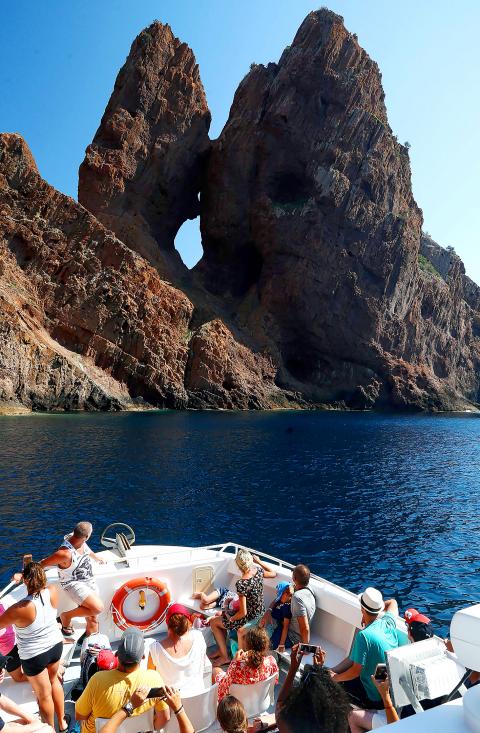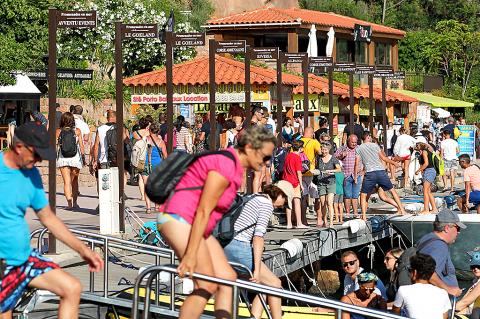“It’s nature’s magical design,” says a tourist guide, waxing poetic as he comments on the impressive red cliffs plunging into a turquoise sea at the Scandola nature reserve on France’s Corsica island.
“Amazing!” exclaims Irena Snydrova, a Czech tourist visiting the UNESCO World Heritage site with her family, along with groups from Italy, Spain and France.
Their boat sidles up to the Steps of Paradise, rocks shaped into a stairway some 15m long, then glides on to Bad Luck Pass, a former pirates’ redoubt.

Photo: AFP
The ages have sculpted the volcanic cliffs into myriad shapes that beguile the visitor, who might imagine a kissing couple here, a horse’s head there, Napoleon’s two-cornered hat further on.
The park, created in 1975, is an ecological dream, being a nature reserve and a protected marine zone that is listed by France’s coastal protection agency and Natura 2000, in addition to its recognition by UNESCO.
It is a prime destination for the some 3 million people who visit Corsica each year, 75 percent of them in the summer.

Photo: AFP
The paradox is that growing numbers of tourists are drawn to Scandola’s pristine waters and stunning geological vistas, endangering its fragile ecosystem.
The park, reached only by boat some 40 minutes from the tiny port of Porto, stretches over 10km2 of sea, and a somewhat smaller area of land.
“The reserve is a jewel for Corsica and the Mediterranean, but several red lights are flashing,” says marine biologist Charles-Francois Boudouresque, listing flora and fauna at risk, including ospreys, seagrass and fish species such as the brown meagre.
The tourist season coincides with the ospreys’ mating season, notes Boudouresque, an emeritus professor at the Mediterranean Institute of Oceanography.
Because of over-tourism, ospreys’ “reproductive success is zero or near zero, with either no chicks or just one chick” per year, he says.
Boudouresque, who also heads Scandola’s scientific advisory council, says the osprey could become extinct in 50 years.
Since last month, at the urging of the scientific council, boats must keep a distance of at least 250m from ospreys’ nests during the breeding season. “It’s a good start,” Boudouresque says.
As for the marine park’s fish species, Boudouresque says he thinks the thrumming of the tourist boats is scaring them away.
But a crew member, who gave his name only as Diego, blamed groupers for the declining population of corb.
“They eat everything,” he said.
Tensions have arisen pitting tour boat operators and fishermen against the reserve’s conservationist Jean-Marie Dominici.
Boudouresque says the seagrass “is not in the best shape,” blaming the anchors dropped by the many boats — some of them private vessels without authorized guides.
“It’s bizarre for a nature reserve to see all these boats,” said Pierre Gilibert, a 65-year-old doctor, who is a regular visitor. “It might be wise to allow access only to professional boats.”
Many share the opinion that private boats are not sufficiently monitored or informed of ecological concerns.
“This morning we saw people climbing on the rocks and berthing their boats in narrow passageways, which is not allowed,” said Gabriel Pelcot, chief mechanic on a cruise ship of the Corsican company Nave Va.
Nave Va, as well as rival Via Mare, uses hybrid vessels: they are powered by diesel up to the edge of the marine park, then switch to electric for a quieter and less polluting presence.
Pelcot notes that this green option is 30 percent more expensive, but he expects it to catch on.
“We must find a compromise between the need for tourists to enjoy this natural treasure and that of not killing the goose that laid the golden egg,” Boudouresque says.
The marine biologist is optimistic that general awareness of the problems is growing.
He envisions ways to marry tourism with preservation. One example, he says, would be to focus cameras on ospreys’ nests so that they can be observed without being disturbed.

On April 26, The Lancet published a letter from two doctors at Taichung-based China Medical University Hospital (CMUH) warning that “Taiwan’s Health Care System is on the Brink of Collapse.” The authors said that “Years of policy inaction and mismanagement of resources have led to the National Health Insurance system operating under unsustainable conditions.” The pushback was immediate. Errors in the paper were quickly identified and publicized, to discredit the authors (the hospital apologized). CNA reported that CMUH said the letter described Taiwan in 2021 as having 62 nurses per 10,000 people, when the correct number was 78 nurses per 10,000

As we live longer, our risk of cognitive impairment is increasing. How can we delay the onset of symptoms? Do we have to give up every indulgence or can small changes make a difference? We asked neurologists for tips on how to keep our brains healthy for life. TAKE CARE OF YOUR HEALTH “All of the sensible things that apply to bodily health apply to brain health,” says Suzanne O’Sullivan, a consultant in neurology at the National Hospital for Neurology and Neurosurgery in London, and the author of The Age of Diagnosis. “When you’re 20, you can get away with absolute

When the South Vietnamese capital of Saigon fell to the North Vietnamese forces 50 years ago this week, it prompted a mass exodus of some 2 million people — hundreds of thousands fleeing perilously on small boats across open water to escape the communist regime. Many ultimately settled in Southern California’s Orange County in an area now known as “Little Saigon,” not far from Marine Corps Base Camp Pendleton, where the first refugees were airlifted upon reaching the US. The diaspora now also has significant populations in Virginia, Texas and Washington state, as well as in countries including France and Australia.

May 5 to May 11 What started out as friction between Taiwanese students at Taichung First High School and a Japanese head cook escalated dramatically over the first two weeks of May 1927. It began on April 30 when the cook’s wife knew that lotus starch used in that night’s dinner had rat feces in it, but failed to inform staff until the meal was already prepared. The students believed that her silence was intentional, and filed a complaint. The school’s Japanese administrators sided with the cook’s family, dismissing the students as troublemakers and clamping down on their freedoms — with